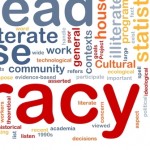
I was catching up with a colleague at a conference last week and was very interested to hear that she is involved in a project about Health Literacy and musculoskeletal conditions. Health literacy is the degree to which individuals have the capacity to obtain, process, and understand basic health information and services needed to make appropriate health decisions.

Health literacy – the degree to which individuals have the capacity to obtain, process, and understand basic health information and services needed to make appropriate health decisions.
It is thought that that low levels of Health Literacy are a potential barrier to healthcare access and health of individuals. Indeed research carried out in America suggests that compared with people with adequate Health Literacy, people with chronic diseases and low Health Literacy have less understanding about their health. Older people, diabetics, asthmatics and those with cancer who have low Health Literacy have poorer levels of health and older people have higher levels of mortality compared with people with adequate health literacy. Other vulnerable groups include: minority populations, immigrant populations, people on low incomes and people with chronic mental and/or physical health conditions.
So it was with interest that I came across this high quality systematic review from the Health Literacy Group in the UK recently published in PLOS ONE, an open access journal. The aim was to estimate the prevalence of low health literacy, and evaluate the impact of low health literacy on outcomes in patients with chronic musculoskeletal conditions.
Here’s what they did
They searched a number of databases up to January 2011 for relevant studies, restricted to English-language articles. Of the 8 studies they deemed to be relevant most were cross-sectional in nature, and five were based in the United States. Due to significant heterogeneity (variability) of study design, participants, outcome measures, and risk of bias the individual studies were compared in a narrative manner.
Here’s what they found
- Prevalence of low health literacy varied from 7% to 42%.
- Of the five studies that reported on musculoskeletal outcomes, only one showed an association (unadjusted) between low health literacy and greater pain and limitations in physical functioning
- Other studies found no significant relationship between health literacy and measures of pain or disease specific questionnaires
- One clinical trial found short-term improvements in the mental health of patients with musculoskeletal conditions after an intervention to improve health literacy
For a quick reminder for those confused by the difference between incidence and prevalence see one of my earlier posts.
The author’s concluded
“The current evidence does not show a consistent association between low health literacy and poorer functional outcomes in patients with chronic musculoskeletal conditions.”
The Musculoskeletal Elf’s views
 The authors of this review found that there were no consistent indexing terms for Health Literacy amongst the electronic databases. They also restricted their search to English-language articles and so may have potentially missed some studies. They also focussed on chronic musculoskeletal conditions that have greatest population and health services burden (e.g. osteoporosis, osteoarthritis and rheumatoid arthritis), and thus the findings may not be applicable to other less prevalent musculoskeletal conditions. However, the authors were faced with a small number of mainly cross-sectional studies with small sample sizes, this precluded interpretation of a causal relationship and thus only a narrative synthesis was possible.
The authors of this review found that there were no consistent indexing terms for Health Literacy amongst the electronic databases. They also restricted their search to English-language articles and so may have potentially missed some studies. They also focussed on chronic musculoskeletal conditions that have greatest population and health services burden (e.g. osteoporosis, osteoarthritis and rheumatoid arthritis), and thus the findings may not be applicable to other less prevalent musculoskeletal conditions. However, the authors were faced with a small number of mainly cross-sectional studies with small sample sizes, this precluded interpretation of a causal relationship and thus only a narrative synthesis was possible.
Although in this review Health literacy was measured with a variety of methods it can be measured using validated tools such as the Rapid Estimate of Adult Literacy in Medicine (REALM) or the Test of Functional Health Literacy in Adults (TOFHLA).
Do you treat patients with low Health Literacy? How do you assess Health Literacy? What is your view on this review, will it impact on your clinical practice? What provision do you make for patients with low Health Literacy especially in terms of self-managment?
Send us your views on this blog and become part of the Musculoskeletal Elf community.
Links
- Loke YK, Hinz I, Wang X, Rowlands G, Scott D, et al. (2012) Impact of Health Literacy in Patients with Chronic Musculoskeletal Disease–Systematic Review. PLoS ONE 7(7): e40210. doi:10.1371/journal.pone.0040210
- Health Literacy Group [accessed 25th August 2012]
- National Network of Libraries of Medicine Health Literacy [accessed 25th August 2012]
- The Musculoskeletal Elf (2012) Running-related musculoskeletal injuries http://www.themusculoskeletalelf.net/running-related-musculoskeletal-injuries/
- Test of Functional Health Literacy in Adults (TOFHLA) [pdf document] [accessed 25th August 2012]
- Rapid Estimate of Adult Literacy in Medicine (REALM) [pdf document] [accessed 25th August 2012]
